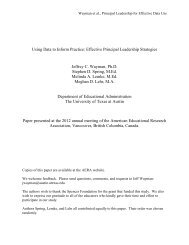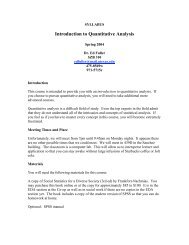A Case Study of Mary Jane Sims Elementary - Department of ...
A Case Study of Mary Jane Sims Elementary - Department of ...
A Case Study of Mary Jane Sims Elementary - Department of ...
You also want an ePaper? Increase the reach of your titles
YUMPU automatically turns print PDFs into web optimized ePapers that Google loves.
therefore should also be cognizant <strong>of</strong> preparing an appropriate curriculum for gifted and talented<br />
students (p. 21). Unfortunately, many minority students do not get identified and do not have the<br />
opportunities afforded to other gifted students. When reviewing reports on national<br />
demographics <strong>of</strong> gifted students in recent years, “the trends revealed that Black, Latino, and<br />
Native American students have always been underrepresented in gifted education programs, and<br />
in some years, their underrepresentation increased” (Harris, Brown, Ford, & Richardson, 2004,<br />
p. 19)<br />
Discipline<br />
<strong>Sims</strong> <strong>Elementary</strong> has faced many <strong>of</strong> the same challenges (i.e., high teacher turnover, low<br />
academic achievement, and high disciplinary actions) as other urban schools with similar<br />
demographics. Despite these sometimes overwhelming hurdles, over the past few years <strong>Sims</strong><br />
staff have been very successful at mitigating many <strong>of</strong> the negative associations common to high<br />
poverty, urban schools, as illustrated by their turnaround from an Unacceptable accountability<br />
rating to receiving Recognized status for the 2005-06 school year from the Texas Education<br />
Association. Despite the increase in student achievement, there is still a general consensus<br />
among teachers and staff members that disciplinary issues on campus continue to be a major<br />
problem, impeding the teachers’ ability to maximize instructional time. As one teacher<br />
expressed, “The behavior is some <strong>of</strong> the biggest problems here and I think that’s the biggest<br />
thing. I spend a lot <strong>of</strong> time managing behavior.”<br />
Interviews with <strong>Sims</strong> faculty and staff identified student discipline as a major concern,<br />
revealing a general perception <strong>of</strong> inconsistency in the way behavioral issues were addressed by<br />
administrators and an overall perceived lack <strong>of</strong> administrative support. More than one teacher<br />
reported that students “just sit there” when sent to the <strong>of</strong>fice. One teacher, discussing the same<br />
issue, commented, “Other teachers had the same situation.” Several teachers also reported a<br />
“lack <strong>of</strong> consequences” for student misbehavior. As a result <strong>of</strong> these perceptions, many teachers<br />
reported they no longer refer problematic students to the <strong>of</strong>fice. The following interviewee<br />
statement sums up the responses <strong>of</strong> these teachers: “We don’t even send them [students] to the<br />
<strong>of</strong>fice much anymore…we send them to each others’ room. We kind <strong>of</strong> take care <strong>of</strong> it ourselves.”<br />
These sentiments could explain the general disconnect encountered between teachers’ perception<br />
<strong>of</strong> student discipline and that <strong>of</strong> administrators. Not all administrators interviewed mentioned<br />
discipline as a problem. In light <strong>of</strong> these findings, referral data may not accurately reflect the true<br />
nature <strong>of</strong> discipline at <strong>Sims</strong> or be an appropriate measure, as used in the 2006-2007 CIP, to<br />
identify improvements in this area.<br />
Although not as frequent, some teachers also reported disciplinary inconsistencies from<br />
classroom to classroom. One respondent said, “Right now it’s each child and classroom for<br />
itself.” Another expressed frustration in the following statement: “I can have my students<br />
walking quietly down the hall, but if they see fourth graders acting wild, they’re going to say, ‘I<br />
can’t wait until I’m older.’ It [discipline] needs to be across the board.” Despite seeing the<br />
previous evidence <strong>of</strong> teachers supporting each other with student discipline problems, there is<br />
Page 15





